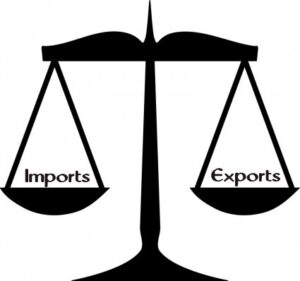Balance of Trade
Meaning
Trade, in general connotation, means the purchase and sales of commodities. In International Trade, purchase and sale are replaced by imports and exports. Balance of Trade is simply the difference between the value of exports and value of imports. Thus, the Balance of Trade denotes the differences of imports and exports of a merchandise of a country during the course of year. It indicates the value of exports and imports of the country in question. If the value of its exports over a period exceeds its value of imports, it is called favourable balance of trade and, conversely, if the value of total imports exceeds the total value of exports over a period, it is unfavourable balance of trade. The favourable balance of trade indicates good economic condition of the country.
Definition
According to Benham
“Balance of trade of a country I the relation over a period between the values of her exports and imports of physical goods.”
A proper record of all material goods exported and imported is kept.With the help of this record of visible exports and imports,balance of trade,as s matter of fact,is a part of balance of payments.Balance of trade may be of three kinds:
- Surplus or Favourable balance of trade
A country may have unfavourable or surplus balance of trade when the total value of the goods exported by it is more than the total value of the goods imported by it.(Exports>Imports)
- Deficit or Unfavourable Balance of trade
A country may have unfavourable or deficit balance of trade when the total value of the goods imported by it is more than the total value of the goods exported by it.(Imports>Exports)
- Equilibrium in Balance of Trade
A country may have equilibrium in balance of trade when the total value of the goods exported by it is equal to the total value of the goods imported by it.(Exports=Imports)
A continuing surplus may, in fact, represent underutilized resources that could otherwise be contributing toward a country’s wealth, were they to be directed toward the purchase or production of goods or services. Furthermore, a surplus accumulated by a country (or group of countries) may have the potential of producing sudden and uneven changes in the economies of those countries in which the surplus is eventually spent.
Generally, the developing countries (unless they have a monopoly on a vital commodity) have particular difficulty maintaining surpluses since the terms of trade during periods of recession work against them; that is, they have to pay relatively higher prices for the finished goods they import but receive relatively lower prices for their exports of raw materials or unfinished goods.
Factors that can affect the balance of trade include:
- The cost of production (land, labour, capital, taxes, incentives, etc.) in the exporting economy in relation to the importing economy;
- The cost and availability of raw materials, intermediate goods and other inputs;
- Exchange rate movements;
- Multilateral, bilateral and unilateral taxes or restrictions on trade;
- Non-tariff barriers such as environmental, health or safety standards;
- The availability of adequate foreign exchange with which to pay for imports; and
- Prices of goods manufactured at home (influenced by the responsiveness of supply)
For more notes on the International Business Management click on the link below :


